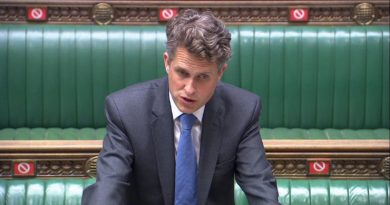Student loan repayment freeze is ‘tax rise by stealth’ for middle earners according to the IFS
The Institute for Fiscal Studies (IFS) has stated that freezing the student loan repayment threshold “essentially constitutes a tax increase by stealth on graduates with middling salaries.”
Education minister Michelle Donelan stated in a written statement on Friday that the salary threshold for student loan repayments in England will be frozen at £27,295 per year, £2,274 per month, or £524 per week for 2022-23.
However, according to Paul Johnson, director of the IFS, the changes will result in a real-term increase of £150 in the amount students with loans will have to repay each year.
“That’ll be a 6 or 7% real-terms reduction and hence a real-terms increase in repayments of c. £150 a year on graduates with student loans,” Mr. Johnson tweeted.
He added: “Not an obvious response to ‘cost of living crisis.”
Labour’s shadow universities minister Matt Western similarly noted: “We have a cost of the living crisis made in Downing Street, and whilst Number is in paralysis – (Chancellor) Rishi Sunak is raising taxes on millions of people.
“Labour has a plan to help hard-working families, including cutting VAT on energy bills, saving most households £200, paid for by a windfall tax on North Sea oil and gas producer profits.”
But Ms. Donelan maintained in her statement that “the system provides value for money for all of society at a time of rising costs”.
“It is now more crucial than ever that higher education is underpinned by just and sustainable finance and funding arrangements, and that the system provides value for money for all of society at a time of rising costs,” Ms. Donelan wrote.
“This government has already confirmed that we will freeze maximum tuition fee caps again for the 2022/23 academic year, the fifth year in succession that we have held fee caps at current levels.”
In 2022-23, post-graduate student loan repayments will be capped at £21,000 per year, £1,750 per month, or £404 per week.
It was previously reported that the chancellor was contemplating suggestions from the 2019 Augar review, which stated that student loan repayment deductions should be imposed whenever an individual earns £23,000 rather than the current rate of £27,295.
Rishi Sunak was urged by a former Conservative education secretary to press through with plans to decrease the earning threshold for student loan repayments in October.
Lord Baker of Dorking, Margaret Thatcher’s education secretary, told Sky News that he “strongly” supported the planned cut because “would-be students should understand the duty they will be taking on.”
Another former Conservative minister has previously suggested that the earnings requirement be decreased to address the “depressing experience” of student debt rising year after year.
When Lord Willetts was universities minister, he oversaw a tuition fee increase and noted at the time that a higher barrier “especially hurts” parents of graduates whose debt grows each year.
Ben Waltmann, a senior research economist at the IFS, said the freeze “effectively constitutes a tax rise by stealth on graduates with middling earnings”.
“Graduates with the lowest earnings do not reach the repayment threshold for student loans so they will be unaffected by the freeze. Those with the highest earnings will pay off their loans either way, so the freeze just means that they will repay their loans quicker,” he said.
“For a graduate earning £30,000, this announcement means that they will pay £113 more towards their student loan in the next tax year than the government had previously said.”
The move, according to Nick Hillman, head of the Higher Education Policy Institute, is “reasonable.”
“Few students or recent graduates will welcome this announcement but it is sensible because the current system has become out of kilter, with taxpayers paying much more than originally planned.
“It is also, however, a very modest and short-term announcement for just one year, reflecting the continuing failure to respond to the 2019 Augar report properly by setting out a long-term plan.”
Hillary Gyebi-Ababio, NUS vice-president for higher education, added: “We were opposed to reducing the salary repayment threshold for student loans.
“We are pleased that the government has U-turned on these plans, which would have retrospectively altered the terms of contracts which have already been signed and targeted those earning lower incomes, in the face of overwhelming student pressure.”




